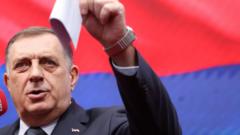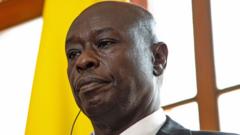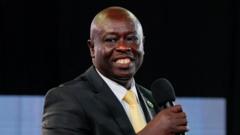The silence is disrupted by a haunting scream. The audience watches as people sift through dirt, uncovering remnants like watches and sandals, at the Sarajevo War Theatre's world premiere of "Flowers of Srebrenica." The play’s somber depiction captures not only the horrors of July 1995 but also the lasting grief and divisions that haunt Bosnia and Herzegovina decades later, resulting from the Srebrenica massacre.
In July 1995, over 8,000 Bosnian men and boys were ruthlessly killed by Bosnian Serb forces in Srebrenica, a supposed safe haven for Bosniaks, largely Muslim people fleeing from the ongoing war. United Nations peacekeepers, instead of offering protection, stood by as Bosnian-Serb General Ratko Mladić orchestrated the transportation of women and children to safety while his troops committed unspeakable atrocities against the men and boys. The bodies of the victims were disposed of in mass graves, later exhumed and scattered to obliterate evidence of the crimes.
The quest for closure remains unresolved for families of the victims, many of whom are still searching for their loved ones. Advances in DNA testing have enabled some families to identify remains and finally give their relatives a proper burial at Potočari Cemetery. The performance, "Flowers of Srebrenica," poignantly illustrates these struggles through visual depictions of victims' clothing and belongings found at the gravesites.
Despite the acknowledgment of genocide by international tribunals, political leaders in Republika Srpska continue to deny such claims, fueling disunity. "I thought, after 30 years, we would reach a consensus," lamented Selma Alispahić, the lead actress in the play and a former refugee herself. These sentiments echo a frustrated call for accountability amidst the ongoing narrative of hatred and denial of historical facts.
The political landscape in Bosnia is equally fragmented. The 1995 Dayton Peace Agreement sought to bring an end to the war but inadvertently created ethnic divisions, splitting Bosnia and Herzegovina into two entities. While Bosniaks and Croats settled in the Federation, Serbs largely occupy Republika Srpska. This division continues to be exploited by current politicians like Milorad Dodik, whose recent legislation threatens the fragile state governance.
In a city where remembrances of the Srebrenica massacre are prevalent, a stark contrast exists just a short distance away in East Sarajevo, where public acknowledgment is scarce. The area demonstrates divided sentiment on accountability and commemoration, as officials express their reluctance to focus solely on the Srebrenica tragedy while claiming that atrocities occurred on all sides of the conflict.
Supporters, however, rally around the memory of the victims. Recent commemorative activities drew crowds from across the country, highlighting solidarity among those who aim to honor the past despite rising tensions. Mirela Osmanović, a staff member at the Srebrenica Memorial Centre, describes an atmosphere thick with anxiety fostered by political leaders. "It feels as though we're not protected anymore," she reflects, voicing a collective worry for the future.
The ongoing political maneuvering feeds into a cycle of tension and fear, complicating the healing process. As Bosnia-Herzegovina grapples with its legacy, the echo of Srebrenica serves as a poignant reminder of the need for truth, memory, and reconciliation in the face of continued division.









